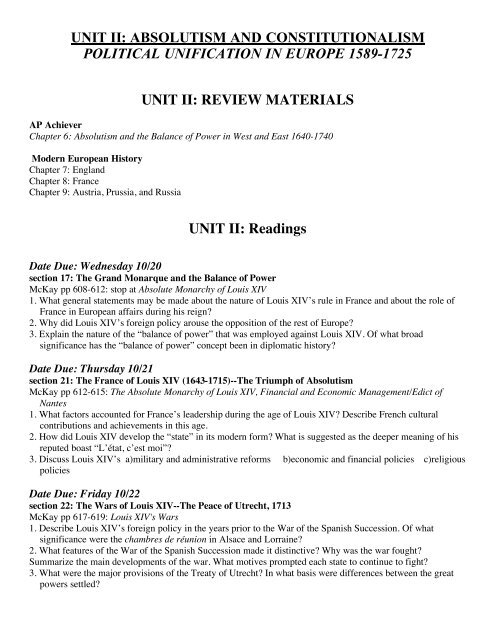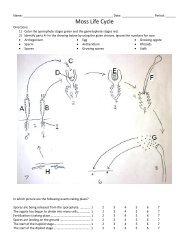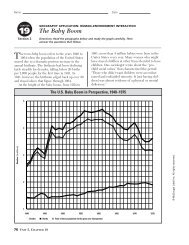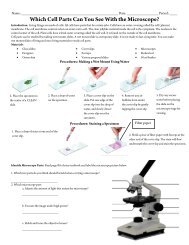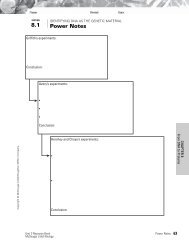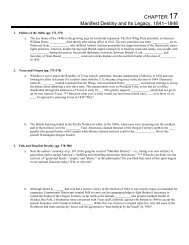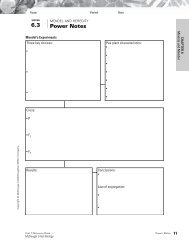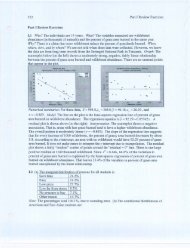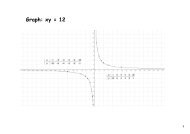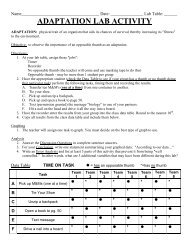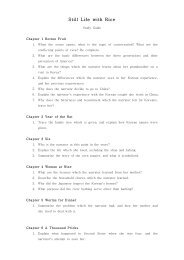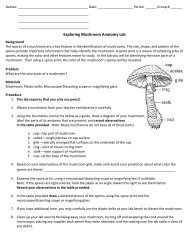U2 questions_terms
U2 questions_terms
U2 questions_terms
You also want an ePaper? Increase the reach of your titles
YUMPU automatically turns print PDFs into web optimized ePapers that Google loves.
UNIT II: ABSOLUTISM AND CONSTITUTIONALISM<br />
POLITICAL UNIFICATION IN EUROPE 1589-1725<br />
UNIT II: REVIEW MATERIALS<br />
AP Achiever<br />
Chapter 6: Absolutism and the Balance of Power in West and East 1640-1740<br />
Modern European History<br />
Chapter 7: England<br />
Chapter 8: France<br />
Chapter 9: Austria, Prussia, and Russia<br />
UNIT II: Readings<br />
Date Due: Wednesday 10/20<br />
section 17: The Grand Monarque and the Balance of Power<br />
McKay pp 608-612: stop at Absolute Monarchy of Louis XIV<br />
1. What general statements may be made about the nature of Louis XIV’s rule in France and about the role of<br />
France in European affairs during his reign?<br />
2. Why did Louis XIV’s foreign policy arouse the opposition of the rest of Europe?<br />
3. Explain the nature of the “balance of power” that was employed against Louis XIV. Of what broad<br />
significance has the “balance of power” concept been in diplomatic history?<br />
Date Due: Thursday 10/21<br />
section 21: The France of Louis XIV (1643-1715)--The Triumph of Absolutism<br />
McKay pp 612-615: The Absolute Monarchy of Louis XIV, Financial and Economic Management/Edict of<br />
Nantes<br />
1. What factors accounted for France’s leadership during the age of Louis XIV? Describe French cultural<br />
contributions and achievements in this age.<br />
2. How did Louis XIV develop the “state” in its modern form? What is suggested as the deeper meaning of his<br />
reputed boast “L’état, c’est moi”?<br />
3. Discuss Louis XIV’s a)military and administrative reforms b)economic and financial policies c)religious<br />
policies<br />
Date Due: Friday 10/22<br />
section 22: The Wars of Louis XIV--The Peace of Utrecht, 1713<br />
McKay pp 617-619: Louis XIV's Wars<br />
1. Describe Louis XIV’s foreign policy in the years prior to the War of the Spanish Succession. Of what<br />
significance were the chambres de réunion in Alsace and Lorraine?<br />
2. What features of the War of the Spanish Succession made it distinctive? Why was the war fought?<br />
Summarize the main developments of the war. What motives prompted each state to continue to fight?<br />
3. What were the major provisions of the Treaty of Utrecht? In what basis were differences between the great<br />
powers settled?
Date Due: Monday 10/25<br />
section 23: Three Aging Empire<br />
McKay pp 621-624: Lords and Peasants in Eastern Europe (stop at Austria and Prussia)<br />
McKay pp 601-603; 639-643: Absolutism and the Baroque in Eastern Europe<br />
1. What major differences may be noted between eastern and western Europe in the 17th and 18th centuries?<br />
2. Why may the Holy Roman Empire, the Republic of Poland, and the Ottoman Empire in the mid-17th century<br />
be characterized as “old fashioned” political organizations?<br />
3. Describe the changes in the HRE brought about by a)the Reformation b)the 30 Years’ War c)the Peace of<br />
Westphalia What may be said about the ambitions and activities of various individual rulers in the Empire?<br />
4. What was distinctive about the political life of the Republic of Poland in the 17th century?<br />
5. How would you characterize the nature of Ottoman rule in eastern Europe? What changes were taking place<br />
in the 17th century?<br />
Date Due: Tuesday 10/26<br />
section 24: The Formation of an Austrian Monarchy<br />
McKay pp 624-626: Austria<br />
1. What were the major episodes and outcomes of the conflict between the Habsburgs and the Turks from 1526<br />
to 1739?<br />
2. Describe the territorial boundaries of the Habsburg Empire about 1740. In what sense was the empire<br />
“international”?<br />
3. How successful were the Habsburgs in their efforts at consolidation and centralization? What steps did<br />
Charles VI take to guarantee the integrity of his territories?<br />
Date Due: Wednesday 10/27<br />
section 25: The Formation of Prussia<br />
McKay pp 626-631: Prussia<br />
1. Explain the role of each of the Hohenzollern rulers from 1640 to 1740 in the formation of Prussia.<br />
2. Describe the special characteristics of Prussia as it was developing in the 17th and 18th centuries. What<br />
observations may be made about a)the army b)government and economic life c)the social development<br />
and economic structure of the country What possible effects might Lutheranism have had on Prussian<br />
life?<br />
3. Why did Frederick II’s (aka Frederick the Great) act of agression seem to be an exception to the policies of<br />
his predecessors? What did he accomplish by this act?<br />
Date Due: Thursday 10/28<br />
section 26: The “Westernizing” of Russia<br />
McKay pp 633-639: Development of Russia, Peter the Great<br />
1. Describe Russia before Peter the Great’s accession to the throne. Why had Russia not shared more fully in<br />
European developments? How was this fact reflected in prevailing social conditions?<br />
2. In what ways did changes in Russia between the time of Ivan the Terrible and the accession of Peter the Great<br />
resemble developments in other parts of Europe?<br />
3. What was happening to the peasantry in 17th century Russia? Describe peasant reactions to a)economic<br />
changes b)religious changes<br />
4. Discuss the tempo, nature, and results of Peter the Great’s internal reforms, with special attention to a)the<br />
church b)the army c)the new capital d)economic policies e)administrative reforms<br />
5. How would you characterize Peter the Great’s foreign policy? What territory did he win for Russia?<br />
6. How would you assess the significance of Peter the Great in the history of Russia?
Date Due: Friday 10/29<br />
section 27: The Partitions of Poland (also review section 23 pp.217-219)<br />
McKay pp 619-621: Decline of Spain<br />
1. How did Austrian and Prussian concern about Russian strength in eastern Europe, and about the balance of<br />
power, lead to the first partition of Poland?<br />
2. What effect did the partition have on the Poles? Why did they not create a more effective national resistance?<br />
3. Summarize the key problems facing Spain by the seventeenth century.<br />
Date Due: Monday 11/01<br />
section 19: Britain--The Puritan Revolution<br />
McKay pp 643-647: Constitutionalism, Puritanical Absolutism<br />
1. What comparisons may be made between events in England in the 17th century and developments on the<br />
continent?<br />
2. Why did Parliament come into conflict with James I? With Charles I? How did the special nature of<br />
Parliament make its resistance effective?<br />
3. How did the Civil War begin? How did Cromwell emerge as ruler of England?<br />
4. What policies did Cromwell follow towards: a)Scotland b)Ireland c)In foreign affairs d)radical opposition<br />
developing within England itself<br />
Date Due: Tuesday 11/02<br />
section 20: Britain--The Triumph of Parliament<br />
McKay pp 647-649: The Restoration and Constitutional Monarchies<br />
1. Explain the general nature of the Restoration in England. Of what significance was the legislation enacted by<br />
the Restoration Parliament?<br />
2. How did religious matters again bring Parliament and king into conflict? What policies of James II<br />
precipitated the Revolution of 1688?<br />
3. Of what constitutional significance for England was the Revolution of 1688? Why have writers of more<br />
recent times “deglorified” the revolution? Give arguments both for and against this point of view.<br />
Date Due: Thursday, 11/04 section 18: The Dutch Republic<br />
McKay pp 649-653: The Dutch Republic<br />
1. Describe Dutch cultural and commercial accomplishments in the 17th century.<br />
2. Explain the nature of government and political life in the 17th century Dutch Republic. (continued on next<br />
page)<br />
3. How did the Dutch and English come into conflict in the 17th century? With what results?<br />
4. How did the Dutch become involved in conflict with Louis XIV? With what results?<br />
UNIT II TEST TENTATIVELY SCHEDULED FOR MONDAY<br />
NOVEMBER 8 th<br />
UNIT II TERMS<br />
Palmer section 17: The Grand Monarque and the Balance of Power<br />
McKay pp 608-612: stop at Absolute Monarchy of Louis XIV<br />
<strong>terms</strong>: 1. Louis XIV 2. Charles II of Spain 3. expansionist policies of Louis XIV 4. "universal monarchy"<br />
5. "balance of power"--its aims, rules, and purposes
Palmer section 21: The Triumph of Absolutism<br />
McKay pp 612-615:<br />
<strong>terms</strong>: 6. parlements 7. The Fronde 8. Louis XIV 9. deeper meaning of "L'etat c'est moi" 10. absolutism<br />
11. Bishop Bossuet 12. armies before Louis XIV 13. military innovations of Louis XIV 14. Versialles 15.<br />
weaknesses of French tax system 16. policies of Colbert 17. Louis XIV: views on religion<br />
Palmer section 22: The Wars of Louis XIV; The Peace of Utrecht<br />
McKay pp 617-619: Louis XIV's Wars<br />
<strong>terms</strong>: 18. War of Devolution 19. Treaty of Nimwegen 20. War of the League of Augsburg 21. Peace of<br />
Ryswick 22. Charles II of Spain 23. William III 24. Duke of Marlborough 25. Philip V of Spain<br />
26. Grand Alliance of 1701 27. Prince Eugene of Savoy 28. treaties of Utrecht and Rastadt 29. asiento<br />
Palmer section 23: Three Aging Empires<br />
McKay pp 621-624: Lords and Peasants in Eastern Europe (stop at Austria and Prussia ) and McKay pp<br />
601-603; 639-643: Absolutism and the Baroque in Eastern Europe<br />
<strong>terms</strong>: 30. similarities of "the 3 empires" 31. economic problems of the HRE 32. "Germanic Liberties"<br />
33. Mazarin's involvement in the HRE 34. HRE imperial diet--problems of 35. ethnic groups within Poland<br />
36. szlachta 37. "exploding the diet" 38. Polish government--failings of 39. janissaries 40. Ottoman<br />
law--characteristics of 41. religion in the Ottoman Empire 42. "terrible turk"<br />
Palmer section 24: The Formation of an Austrian Monarchy<br />
McKay pp 624-626: Austria<br />
<strong>terms</strong>: 43. 3 dominions of Austria 44. Siege of Vienna 1683 45. Prince Eugene of Savoy 46. Austrian<br />
Empire--"international" characteristics 47. Pragmatic Sanction<br />
section 25: The Formation of Prussia<br />
McKay pp 626-631: Prussia<br />
<strong>terms</strong>: 48. influence of small armies 49. Charles XII 50. geography of Prussia 51. Hohenzollerns of<br />
Brandenburg 52. Frederick William--the Great Elector 53. uniqueness of Prussian army 54. Junkers<br />
55. Prussian economic policies 56. army's effect on Prussian social classes 57. Prussian middle class<br />
58. Frederick William I<br />
Palmer section 26: The "Westernizing" of Russia<br />
McKay pp 633-639: Development of Russia, Peter the Great<br />
<strong>terms</strong>: 59. Mongol invasions 60. Ivan the Terrible 61. "windows on the west" 62. battle of Narve<br />
63. Time of Troubles 64. Michael Romanov 65. battle of Poltava 66. rebellion of the streltsi 67. St.<br />
Petersburg 68. Stephen Razin 69. Old Believers 70. Peter the Great--character of 71. Peter the Great-goals<br />
of 72. Russian absolutism--differences from the west<br />
Palmer section 27: The Partitions of Poland<br />
McKay pp 619-621: Decline of Spain
<strong>terms</strong>: 116. John Sobieski 117. War of the Polish Succession 118. Treaty of Kuchuk 119. Polish<br />
dissolution--effects on Europe. 120. Galacia 121. West Prussia<br />
Palmer section 19: The Puritan Revolution<br />
McKay pp 643-645: Constitutionalism<br />
<strong>terms</strong>: 73. Puritans and Anglicans 74. religious emigration 75. English economy--17th century 76.<br />
unique aspects of English government 77. James I 78. James I--conflict with Parliament 79. organizational<br />
structure of English parliament 80. "ship money" case 81. Scottish Rebellion 1637 82. Long Parliament<br />
83. Solemn League and Covenant 84. Oliver Cromwell and the "Roundheads" 85. the "Ironsides" and their<br />
demands 86. "Prides Purge" and The Rump 87. Commonwealth's Irish policies 88. Levellers 89.<br />
Cromwell as "Lord Protector"<br />
Palmer section 20: The Triumph of Parliament<br />
McKay pp 647-649: The Restoration and Constitutional Monarchies<br />
<strong>terms</strong>: 90. Restoration of 1660 91. Parliamentary legislaton during the Restoration 92. Dissenters<br />
93. Act of Settlement 1662 94. Charles II and religion 95. Treaty of Dover 1670 96. Test Act of 1673<br />
97. Tories and Whigs 98. James II 99. William and Mary 100. Bill of Rights 1689 101. United Kingdom<br />
of Great Britain 102. post 1688 Irish "penal code" 103. Bank of England 104. 1688 Glorious Revolution<br />
Palmer section 18: The Dutch Republic<br />
McKay pp 649-653: The Dutch Republic<br />
<strong>terms</strong>: 105. United Provinces--17th century 106. Baruch Spinoza 107. Christian Huyghens 108. religion<br />
in Holland--17th century 109. Araminius 110. Dutch shipping 111. Bank of Amsterdam 112.<br />
government structure of Holland (Estates General etc.) 113. William III 114. Navigation Act 1651 115.<br />
Triple Alliance


